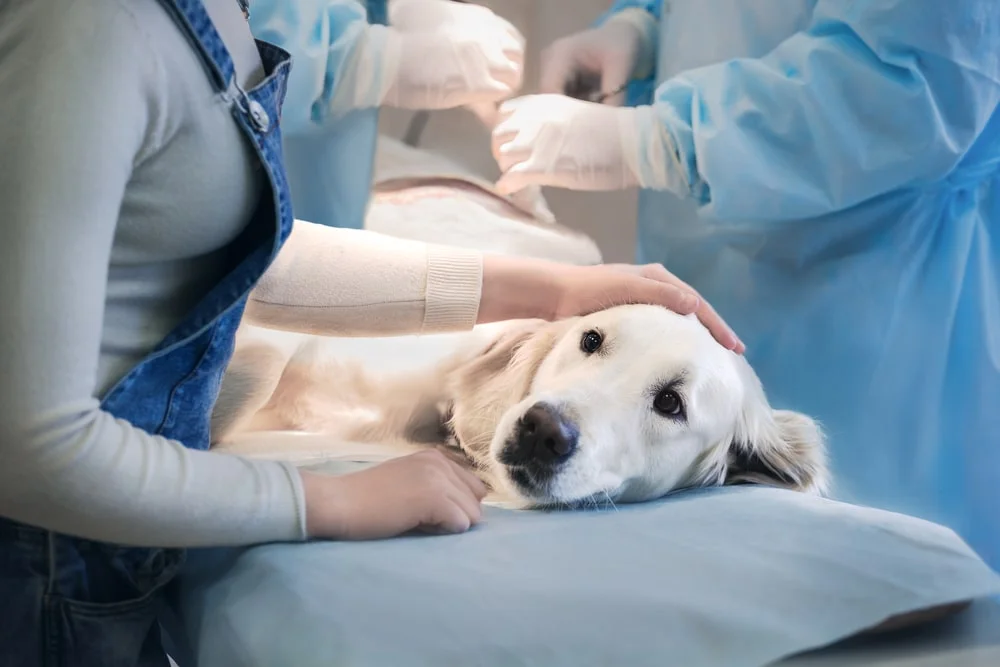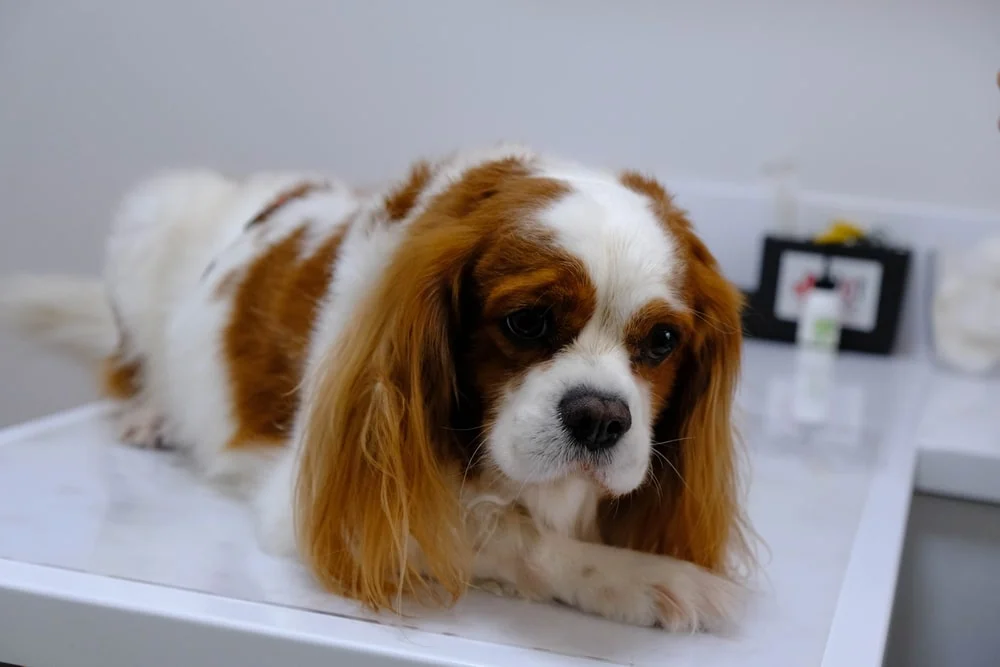PET HEALTH
Dealing with dog intestinal blockages can be distressing, both for you and your furry best friend.
But stress may be the least of your worries. If you don’t act quickly, your dog’s intestinal blockage could become fatal. Many dogs with this condition need costly surgery to remove the potentially life-threatening blockage. “A general price range would vary in the range of $2,000 to $8,000,” says Dr. Jerry Klein, DVM, with the American Kennel Club Canine Health Foundation.1
While pet insurance can help you deal with the cost of dog surgery for intestinal blockage, learning about the condition can help you know what to do if such an emergency should arise.
Here’s what you need to know about a dog intestinal blockage — also known as gastrointestinal (GI) or bowel obstruction in dogs. We’ll jump into what causes it, dog blockage symptoms to watch out for, when to take your dog to the vet, and how much surgery could cost you.
What Is Intestinal Blockage in Dogs?
Bowel or intestinal blockages can happen to any breed of dog. This condition typically occurs when a dog swallows something they shouldn’t — either accidentally, such as a piece of rawhide, or misguidedly, such as an oh-so-irresistible piece of trash.
“Gastrointestinal obstruction in dogs is a condition where there is a partial or complete blockage of the stomach or intestines preventing the normal flow of GI contents through the tract,” explains Dr. Klein.
“Intestinal blockage is fairly common in dogs,” adds Dr. William Culp, DVM, DACVS (SA), a professor at the UC Davis School of Veterinary Medicine. “It usually occurs after eating something that should not be eaten, like socks, grass, carpets, toys, etc.”2
Don’t take dog intestinal blockages lightly. Incidents of GI obstruction in dogs can quickly become life-threatening and rarely go away on their own, so you should treat them as an emergency.3
“This can be a very serious situation, and dogs should be evaluated by an emergency service immediately,” says Dr. Culp.
Causes of Intestinal Blockage in Dogs
“There are many ways that a dog’s bowels could become blocked, but eating foreign objects is by far the most common offender,” says Dr. Culp. “We also see intestinal blockage from intestinal cancers, but this is much less common.”
“Obstruction due to intestinal intussusception, where a part of the intestine ‘telescopes’ in on itself, is more commonly seen in younger dogs secondary to parasitic infection, parvoviral infection, or foreign body ingestion,” says Dr. Klein.
“Many cases of dog intestinal blockage, however, can be idiopathic (unknown) in cause,” Dr. Klein adds. That’s why it’s so important to know what symptoms to watch out for.
Intestinal Blockages May Hurt Your Pet and Your Wallet
Symptoms of Intestinal Blockage in Dogs
Recognizing the signs of blockage in dogs early on can play a big role in getting prompt veterinary attention, which can be crucial to a successful outcome.
Symptoms of intestinal blockage in dogs may vary depending on their size and the foreign body they ingested. But here are some telltale signs that your dog may be dealing with an obstructed bowel:4
- Vomiting (often acute and repeated)
- Anorexia (refusal to eat)
- Abdominal pain
- Dehydration
- Diarrhea (with or without the presence of blood)
- Weight loss
- Lethargy
“GI obstructions cause repetitive vomiting, pain, and loss of appetite,” says Dr. Klein. “Obstructions lead to dehydration, electrolyte abnormalities, possible tissue perforation, endotoxemia, and hypovolemic shock. So they should be considered and treated as an emergency.”
Dog Intestinal Blockage Timeline
It may be tempting to wait and see if your dog’s blockage will clear itself up. However, Dr. Culp urges pet parents not to wait before contacting their veterinarian about a potential blockage. “If there is any concern for intestinal blockage, we generally recommend evaluation by a veterinarian immediately and would not recommend home remedies,” he says.
Waiting could cause the foreign object to progress further into the digestive tract and become a bigger problem.
Meanwhile, symptoms of intestinal obstruction may change or increase in intensity the longer the blockage exists.
“If clinical signs progress to severe lethargy or collapse, or an increase in abdominal size is noted, then this would suggest a significant worsening of the disease and requires immediate evaluation,” Dr. Culp warns.
“A veterinarian should always be consulted with any dog that has repetitive vomiting and is unable to hold down fluids,” says Dr. Klein. “Depending on the veterinarian’s response, withholding food for 6 to 12 hours and water for 3 to 4 hours may be considered. Under no conditions should an owner delay evaluation of a dog that has prolonged vomiting lasting longer than 12 to 24 hours.”
Types of Dog Surgery for Intestinal Blockage
There are different types of surgery your dog may undergo for an intestinal blockage.
- Endoscopy: For foreign bodies confined to the stomach, your vet may consider an endoscopy. “Endoscopy is usually limited to retrieving foreign bodies of small to moderate size from the stomach, not the intestines,” says Dr. Klein.
- Exploratory laparotomy: “Exploratory surgery is indicated if a foreign body is present past the entrance to the small intestine, if there are foreign bodies in multiple locations, if there are signs of peritonitis, or where endoscopy is not available,” says Dr. Klein.
Dog Intestinal Blockage Surgery Cost
While dog intestinal blockages often require surgery, your dog will need diagnostic tests first.
“Generally, when an intestinal obstruction is suspected, diagnostics would include bloodwork, radiographs, and abdominal ultrasound — although other advanced imaging may also be recommended to help guide further therapy,” says Dr. Kulp.
From there, your vet will diagnose your dog. If they have an obstruction, they’ll likely need surgery. Dog intestinal blockage surgery costs between $2,000 and $8,000. Klein adds that the cost of surgery for intestinal obstruction can vary depending on the following factors:
- The location of the obstruction: An obstruction in the stomach will likely be easier to resolve than one in the small intestines.
- The type of obstruction: Sharp or toxic foreign objects may require additional protective measures during surgery.
- The condition of the patient: Is the dog old, ill, or dehydrated? These could require additional precautions.
- The condition of the intestinal tract: Is the dog’s system healthy enough to recover if the vet removes part of the intestine?
- The surgeon: Some surgeons may cost more than others, depending on their years of experience or location.
Don’t forget to factor in the cost of aftercare, which can also add up fast.
“Aftercare will depend on the condition of the patient and the extent of the surgery. Dogs that presented in hypovolemic shock … or required intestinal resection and anastomosis (removing injured part of the intestine and re-building) will require additional time and cost, as their prognosis would be more guarded,” says Dr. Klein.
How To Prevent Intestinal Blockage in Dogs
The best way to avoid expensive intestinal blockage surgery for dogs is to prevent the blockage from happening in the first place.
Dr. Klein recommends closely supervising your dog, especially if they’re known to eat things they shouldn’t. You’ll also want to secure garbage bins, pick up objects your dog could eat, and examine toys for wear and tear, then remove those that present a hazard.
“String, thread, and rope fibers are especially concerning because they can cause severe damage to the lining of the intestines that could lead to perforation,” Dr. Klein adds.
Worried About the Cost? Dog Insurance Can Help
Even the most diligent dog owner may not be able to prevent an intestinal blockage from happening. A miniature pinscher dog, Gilligan, was hospitalized for a urinary obstruction after eating something he shouldn’t have. His diagnostic tests, hospital stay, and surgery cost about $4,300. His family’s MetLife Pet Insurance policy covered the entire veterinary bill. This way, they were able to focus on Gilligan’s care and recovery.5
If you’re concerned about the risk of bowel obstruction — and the emergency surgery bills that often accompany it — dog insurance may be worth it for you.
GI obstruction in dogs can quickly become life-threatening. Worrying about the cost of care is the last thing pet parents should have to deal with in situations like that. Get a quote today and customize a plan that works best for you and your pet.
Help Your Pet Feel Better
855-270-7387



